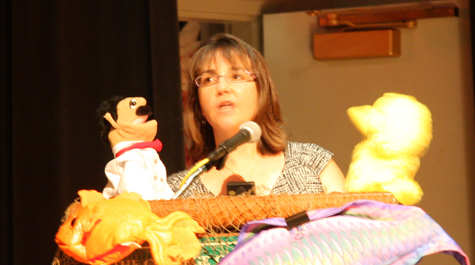W&M's annual Raft Debate entertains
At a podium festooned with fishing nets and plastic sea-creatures, faculty from the natural sciences, the social sciences and the humanities gathered to settle the age-old question of ultimate usefulness in a thoroughly silly manner. Yes, it was the College’s Raft Debate and students, faculty, staff and general supporters of academics and irreverence packed the Commonwealth Auditorium Sept. 29 to witness the annual tradition.
The evening was structured thusly: Professors from three different fields of academia are stranded on a desert island after falling victim to a horrible hypothetical storm. With only one raft between them they are forced to use logic, rhetoric, and, in the case of one professor, puppets, to demonstrate why they and their field are the most deserving of salvation. They are joined on this island by a judge whose job is to moderate the debate, and a devil’s advocate whose job is to argue conclusively that all three should be left to die. Laurie Sanderson, dean of graduate studies and research, assumed her regular role as the ultimate arbiter.
{{youtube:medium:right|hYigOO60dhw, Raft Debate 2010}}
Representing natural science was Lisa Landino, a chemistry professor whose suggestion of “cross-fertilization of disciplines” on the island was met with raucous laughs. She began her arguments by waxing poetic about fat metabolization on a desert island, but then ventured into more serious territory, bringing two of the world’s “great scientific minds” to the podium with her. Albert Einstein and Big Bird, both in puppet form, helped lead her through an alphabetized list of all the great things science has done for humanity, from Advil to Zoloft.
Following that, psychology’s Lee Kirkpatrick took the stand, only to be interrupted by a persistent beeping sound thirty seconds later. Landino, who had bragged earlier about bringing her own timer (“Because I’m a scientist. And it’s what we do.”) had forgotten the device at the microphone, prompting Kirkpatrick to remark, “And that’s what’s wrong with natural science.”
Following that, the psychology professor expounded on a theory that the social sciences were currently the most useful field to humankind, likening natural science to a high-powered drill which probes every question but the right one, and the humanities to a bunch of bickering academics. To illustrate this point he brought three members of the audience forward to the stage with him, who were subsequently lectured at by the humanities and ignored by natural science in favor of rocks and planetoids. Only social science, he argued, could meet their needs head on.
Rounding out the academics was Richard Palmer, a professor in the department of theatre, speech & dance, who opened by admitting that he was having a grand old time on the island.
“I’m rehearsing some parrots right now on the other side of the island for an abridged version of ‘South Pacific,’” he joked.
He followed that point up with a dig at the theatricality of his fellow debaters. He mentioned how well the humanities got on before the advent of modern science and elaborated on the artistic merits of ‘Gilligan’s Island.’ Palmer closed with a tongue-in-cheek suggestion to Landino that “you and I can fit in this raft together.”
Ironically enough, though, the argument that came through as the most persuasive delivered its message through song. Backed up by two guitars strumming the chords to Don McLean’s “American Pie,” law professor and devil’s advocate Scott Dodson led the audience through five rousing choruses of “My, my, please let them all die.”
After the four debaters were given three minutes each for a rebuttal, during which Palmer mentioned how much he appreciated his colleagues’ willingness to embarrass themselves and Kirkpatrick nodded knowingly, the audience was invited to ask questions of the panel.
{{youtube:medium:right|lpmsAvGbr0E, Raft Debate Q&A}}
One audience member asked of the humanities representative “the most important question you could ask of someone stranded on a desert island: Ginger or Mary Ann?” Palmer simply laughed and answered back that he wasn’t telling.
Later, a student in the audience asked the four contestants what they believed was the crucial element in a good grilled cheese sandwich. After natural science, social science, and humanities answered heat distribution, a well-rounded, well-adjusted meal, and imagination respectively, the devil’s advocate’s answer garnered the loudest applause.
“It depends on what you mean by ‘grilled cheese,’” the law professor said with a smile.
Kirkpatrick would later speculate that it was that moment which clinched it for his colleague. After a vote conducted by cheering delivered a solid win to the devil’s advocate, the psychology professor admitted that after that final answer “I’d have voted for him myself.” Others however, were slightly more dubious.
“I didn’t know I could bring a band!” Landino lamented after the event. “And I can’t sing, so I just brought puppets.” She later added, “How’s he planning to get a band to this deserted island anyway?”
Her sentiments were echoed by the two other academics left stranded on the island by popular demand. When asked about the victor’s theatrics, Kirkpatrick admitted defeat. “He timed it perfectly, he had an extra verse for a rebuttal. It was very clever.”
However, it was Palmer, out of all three contestants, who seemed the most optimistic about the future prospects of his hypothetical predicament. “The humanities, as always, will have to make do with their imagination after being left on this desert island,” he remarked “But who cares? We’re having fun.”


















